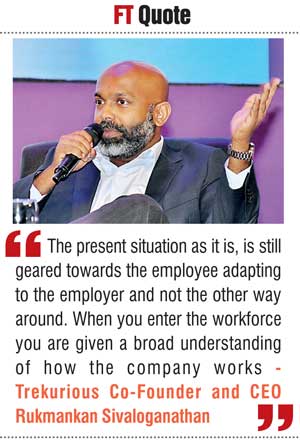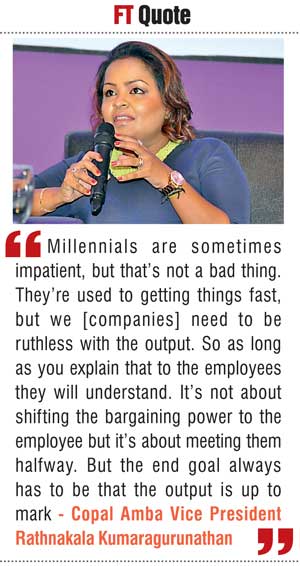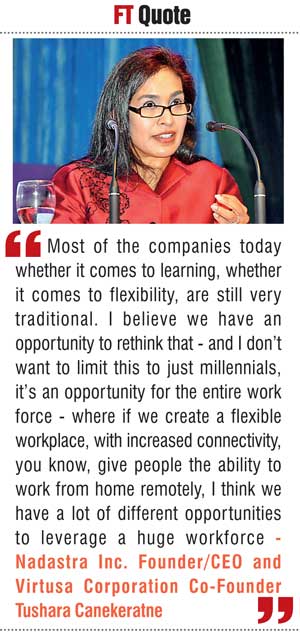Monday Feb 16, 2026
Monday Feb 16, 2026
Friday, 21 October 2016 00:01 - - {{hitsCtrl.values.hits}}
By Madushka Balasuriya
Millennials are categorised as the generation born between 1981 and 1996. It is a generation which has witnessed unprecedented change and the emergence of the digital era. Indeed, there are many adults living today who have never lived in a world without Google. Along with the advent of smartphones, this has led to a generation accustomed to instant gratification and knowledge.
However, while the world at present sees Donald Trump attempt to supplement his election campaign with fear and loathing, scores of refugees left to die at sea as countries draw imaginary lines across man-made borders and Britain’s parting of ways from the EU based partly on a campaign of narrow-minded bigotry, it can be easy to overlook that the next generation has in the most part left behind the politics of their predecessors. Some of the most prevalent traits of millennials are that they are more globally minded, optimistic and tolerant.
This is something that goes largely unnoticed when we speak of a generation that to many can come across as entitled, sometimes harbouring unrealistic ambitions. It is after all human nature to distrust what we do not understand, and millennials fall perfectly into that category. It is in this context that a panel discussion titled ‘Harnessing Millennials’ was held at the 37th National Conference of Chartered Accountants at the BMICH yesterday.
Enormous opportunity
Kicking of the session Nadastra Inc. Founder/CEO and Virtusa Corporation Co-Founder Tushara Canekeratne offered some context for the discussion to follow. Despite being part of arguably both the Baby Boomer generation and Generation X, Canekeratne has “operated as a millennial all my life” and was fortunate to be able to study Computer Sciences at a British university shortly after the subject was introduced, while also being able to work with companies who were always on the “leading edge” of technology in the US later on.
 “During this phase of my life, I was very fortunate to be surrounded by extraordinary peoples and some of the key qualities they all possessed were that they had great attitudes; they were very competent; they were lifelong learners; very humble; weren’t afraid to fail; always willing to take on a challenge; acted with the highest of integrity; but most of all they were all good human beings,” she said.
“During this phase of my life, I was very fortunate to be surrounded by extraordinary peoples and some of the key qualities they all possessed were that they had great attitudes; they were very competent; they were lifelong learners; very humble; weren’t afraid to fail; always willing to take on a challenge; acted with the highest of integrity; but most of all they were all good human beings,” she said.
“I was really fortunate not to have experienced racism or gender bias, and that is not the norm. And I still have to figure out what to do about it. But I can tell you this next generation, because of connectivity, because of globalisation, they don’t look at colour, skin, and race. So when we look at culture and inclusivity, I think we have an enormous opportunity ahead of us.”
Mind the (Generation) Gap
But to capitalise on this opportunity, the way businesses interact with the newest generation needs to change. Looking at Sri Lanka, one of the most fundamental problems when it comes to hiring millennials is that most companies are run by either Gen X or Baby Boomers. Bridging this gap is a difficult but not impossible task, with Canekeratne of the opinion that this represents an opportunity for even more widespread reform when it comes modernising the workplace.
“Most of the companies today, whether it comes to learning, whether it comes to flexibility, are still very traditional. I believe we have an opportunity to rethink that - and I don’t want to limit this to just millennials, it’s an opportunity for the entire workforce - where if we create a flexible workplace, with increased connectivity, you know, give people the ability to work from home remotely, I think we have a lot of different opportunities to leverage a huge workforce.”
“I think the millennials are going to force us to make those shifts.”
The question also arises over whether it’s the millennials who should be the ones adapting and not the other way around. Canekeratne thinks that this is focusing on the wrong issue.
“I think there’s a bit of a misnomer when it comes to millennials, in that we tend to look at them as a problem that needs to be solved. I would like us to instead think about the opportunity we have, because the world is moving so fast; we can get stuck with how we’re doing things or we can say let’s embrace it and move.
“When you look at millennials we have to transform ourselves. If someone tells you, ‘this is how we’ve always done things,’ that should be a red flag to young people in the audience. You’re at the wrong organisation.”
Also on the panel was Trekurious Co-Founder and CEO Rukmankan Sivaloganathan, who noted that while millennials were definitely forcing changes in the workplace, at present the traditional system was still in place.
“The present situation as it is, is still geared towards the employee adapting to the employer and not the other way around. When you enter the workforce you are given a broad understanding of how the company works, the culture, etc.
Copal Amba Vice President Rathnakala Kumaragurunathan, meanwhile, noted that while it was true that millennials tended to be “sometimes impatient” this wasn’t necessarily a bad thing. Companies just need to ensure that they get the best out of them like any other employee, she added.
“Millennials are sometimes impatient, but that’s not a bad thing. They’re used to getting things fast, but we [companies] need to be ruthless with the output. So as long as you explain that to the employees they will understand. It’s not about shifting the bargaining power to the employee but it’s about meeting them halfway. But the end goal always has to be that the output is up to mark.”
Millennial Ambitions
Kumaragurunathan related a story of how during one job interview, the prospective employee, who was a millennial, had outright  asked how what it would take for him to become Associate Vice President of the company.
asked how what it would take for him to become Associate Vice President of the company.
“We were hiring an intern. He was above average but not a ‘wow’ candidate. His first question to me was not what he needs to be permanent or to go to the next level, but it was: ‘what should I do to become AVP?’ I stopped him there, I said it’s good to have ambition it’s not a bad thing, but you also need to have self-awareness.”
Kumaragurunathan believes that to better harness this ambition, it’s important to have structured career development goals assigned to them. “We have to realise that they want to move up fast, but as long as they’re contributing and learning you need to make sure that you let them know what exactly is expected of them.”
However, she notes that there is still the chance that you might lose a high performing employee who moves on to greener pastures in search of more job satisfaction or simply a different challenge. This is a legitimate concern of many companies looking to hire millennials, but Kumaragurunathan thinks that on the whole it won’t happen.
“If you’re not able to retain them and the move to your competitors, it’s what it is. But on the whole I tend to disagree with the idea that millennials don’t stay at one place for too long. What I think it is, is that they don’t want to be complacent. This era is slightly different to the previous generations in that they don’t want to work up to a point where they’re comfortable. Comfort zone is not very comfortable for this generation.
“Organisations need to understand that, and as long as you keep empowering them and encouraging and have an open door culture, where the moment they think their skills are being under-utilised you’re able to throw at them the next opportunity - and most organisations have that - then they will stay.”
Work/life balance
Sivaloganathan had a similar view, adding that millennials had a much different view to previous generations when it came to work/life balance, and that meant that many would shift jobs early on in their careers before settling on something they were content with
“At the moment it’s pretty much market forces at play. Eventually jobs that require some long-term commitment will be filled up by those who align themselves with that worldview. And the ones whose ambition leads them to constantly move around, I think that takes place fairly early in their careers.
“Because one thing that is quite different about this generation is that work/life balance is very important for them - not in the way  that we know it in the corporate world, where you go home and six and don’t answer emails - it’s about finding what they’re really passionate about and doing it. People who feel that way will eventually gravitate towards jobs that they love and want to do.”
that we know it in the corporate world, where you go home and six and don’t answer emails - it’s about finding what they’re really passionate about and doing it. People who feel that way will eventually gravitate towards jobs that they love and want to do.”
Canekeratne built on this point, observing that millennials were known to strive for something more fulfilling from the workplace than simply remuneration.
“This next generation wants feedback every day. Millennials view work as a part of life, not a separate activity that needs to be balanced by it. For that reason they place a strong emphasis on finding work that is personally fulfilling. They want to work to afford them the option to make new friends, learn new skills and connect to a larger purpose.
“Millennials have high expectations of their employers but they also set high standards of themselves. Keep them engaged and they will be happy to overachieve for you.”
While it’s clear that millennials are going to be bringers of change to the workplace over the next decade, Sivaloganathan expressed concern that their need for quick success could prove to be detrimental in the long run.
“Millennials are impatient, it’s true. I suppose it’s a function of the world we live in. People have far greater access to information, they know what’s happening everywhere in the world. They have far more role models of people in their early 20s making it big. There’s also a lot of impatience about wanting to succeed. So I suppose the negative aspect of this is that there’s a lot of skill or depth of experience that is lost, and that’s bit unfortunate,” he noted.
Canekeratne however countered that every generation has seen its share of individuals with misplaced ambitions, but opined that the present generation’s positives far outweighed the negatives.
“Yes, you’re always going to get people who are ambitious for the wrong reasons.
I think every generation has that. But if I look at the skills and the ambition because of their environments and what they’ve grown up with, I think it’s a good thing. You rather be around people who are ambitious, who want to move fast, where that’s the only way you can be successful. Rather than a situation where people are holding you back.”
Pix by Lasantha Kumara